Fruits of Labor
I've been in the tropics for a few days now, descending further and further into lower latitude. By now, I'm more or less in the jungle. Fruit-bearing trees are naturally abundant, and various fruits appear on the ground on the side of the road, including oranges, limes, and avocados. I haven't picked one up and eaten one yet, but I'm tempted. I may begin.
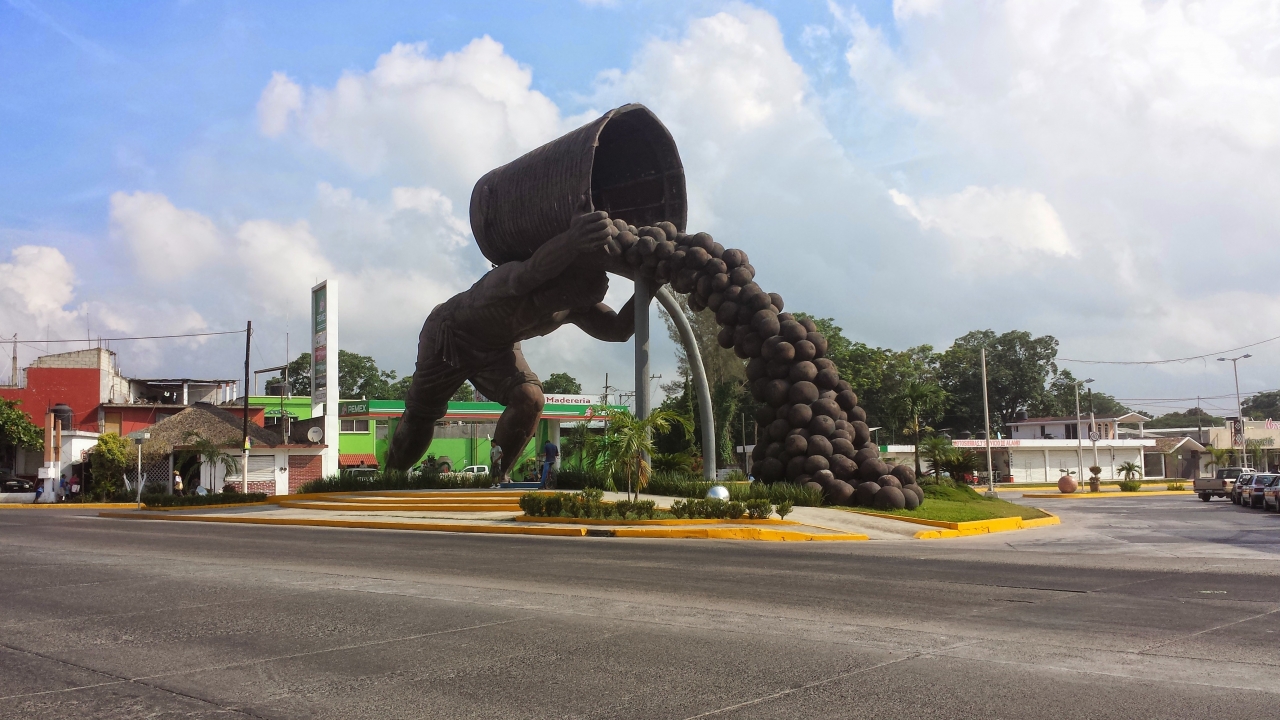
I've discovered a dirty little trick. When I stop at a fruit stand and ask how far it is to the next town, I'm usually offered a piece of fruit. Since I've noticed that pattern, I've been stopping and asking at almost every fruit stand I see, even when I'm confident that I know distance and direction perfectly.
Poza Rica is the second-largest city I've visited in Mexico, after Tampico, and the largest one I've stayed in. Like Tampico, traffic is bad and chaotic, and people use their horns frequently. It still wasn't as bad as Tampico, so I wound up staying.
I've been told that here, horns are not considered rude at all, nor reserved for emergencies. A honk can mean anything from "Get out of the way," to "Just letting you know I'm here," to "Hurry up," to "Go ahead, I'll wait," to "Hello." I can't be the only one that sees this as both obnoxious AND dangerous, in a "Boy Who Cried Wolf" kinda way.
About an hour after I left Poza Rica, I saw signs pointing me to pre-European ruins. The sign said it was 8 km off the highway. That would be 16 km round-trip, almost an hour out of my day, along with however much time I spend at the ruins. But today wasn't a long day, and this whole thing is supposed to be an adventure. I went.
What the sign didn't say was that it was actually more than 8 km, and that almost all of it would be impressively steep hills, both down and up. For the first time since Wyoming, I used my lowest gear, and even then had to rely on raw leg strength to get my pedals around. I knew it wouldn't be much easier coming back. When I looked on the map later, I found two ways of getting there that would have at least been a little shorter.
I managed to get to the ruins slightly before it opened. They only took cash (of course), and the ticket price was equal to half of what I had left. I would need an ATM soon. I no longer had enough money for a hotel.
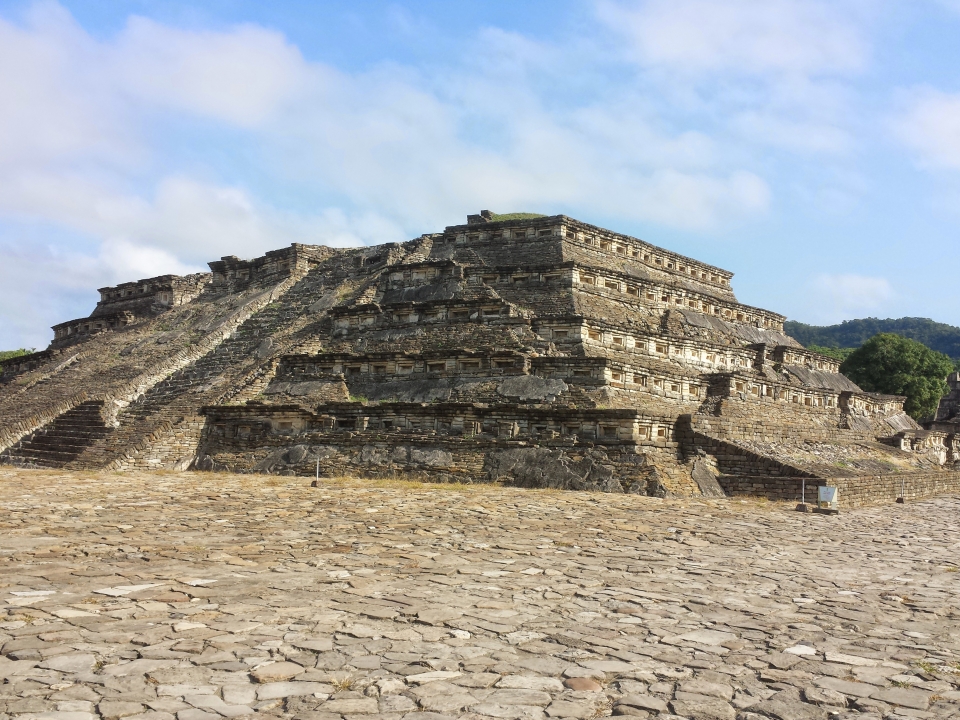
I had been expecting a single pyramid, and what I got was a city of them! The ruins were last inhabited roughly 1,000 years ago. They were not only large and well-built, but done artistically, with attention to detail. At one time, they might have been called ornate. And they used to be painted! I thought they were already stunning, especially against their surrounding backdrop of mountains and jungle, but to imagine them in brilliant color!
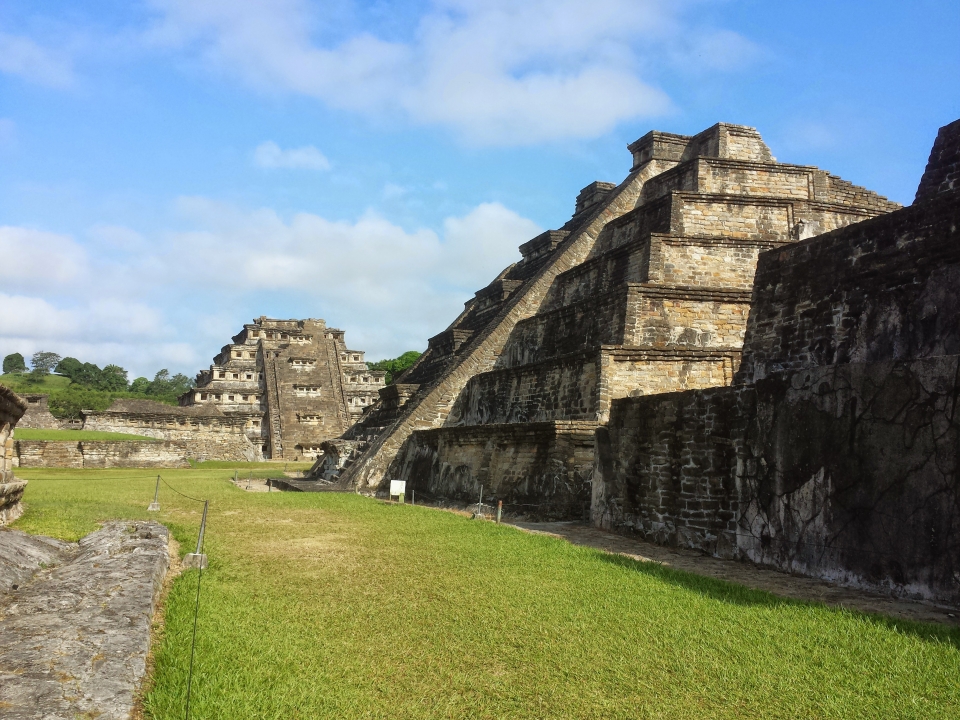
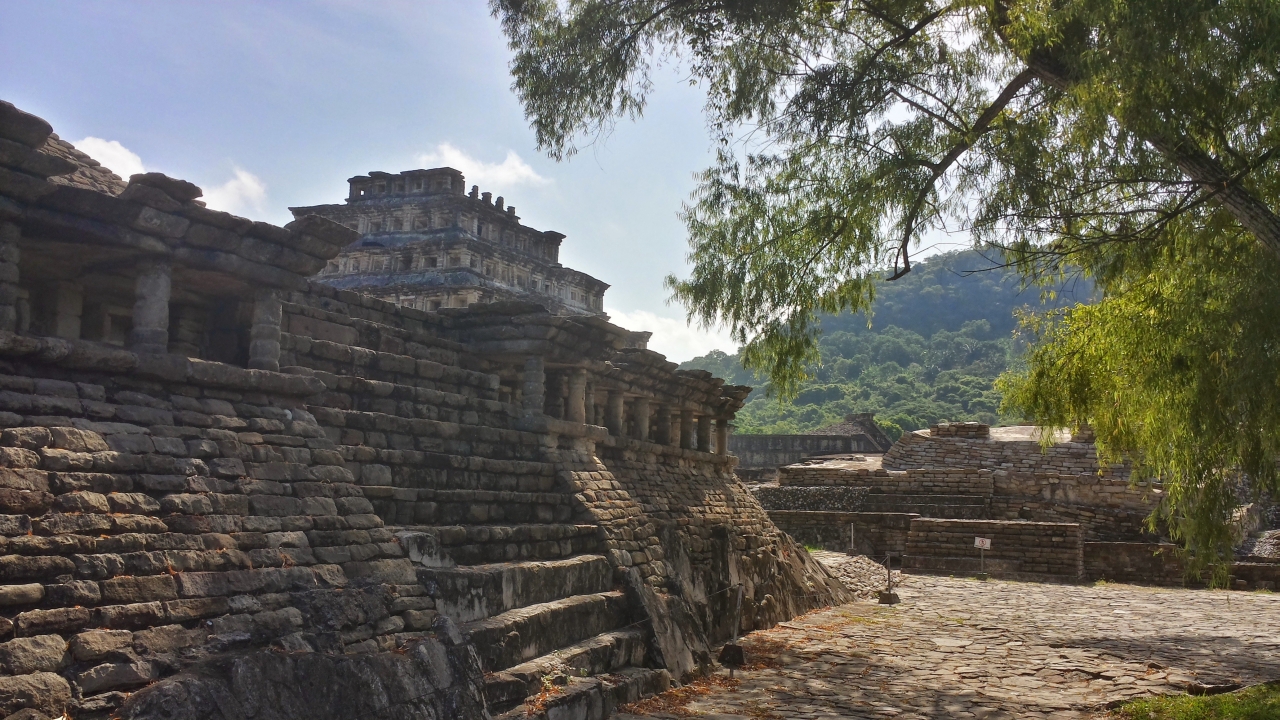
It made me think how easy we have it. These were the greatest structures known to society at that time. No air conditioning. No electricity. Only rudimentary plumbing. No WiFi! And they built it all by hand, carrying stones great distances if necessary - barefoot in the jungle - then chiseled the stones and stacked them one at a time. And then they got to sleep on the ground, or if they were lucky, inside on the stone. Wheeee!
No matter how difficult my current life may seem, I've got it easy. Electricity. Toilets. Air conditioning, sometimes. Shoes. Valeria! Only a couple hundred years ago, all these things were out of reach even to the world's richest man. In terms of human history, that is a short time. In geologic terms, it's the blink of an eye. And on a cosmic time scale, it's nothing. How small a part of time we share, and how quickly the world keeps marching on.
I would later learn that when these ruins were discovered in the early 1900s, every last structure was completely buried. Currently, only about 25% of the original city has been excavated; the majority of the city is still underground! It had only taken a handful of centuries for Mother Nature to take over and for our greatest triumphs to succumb to the Earth. To me, it is comforting to know that whatever I do and whatever problems I have, not long after I'm gone, it won't matter.
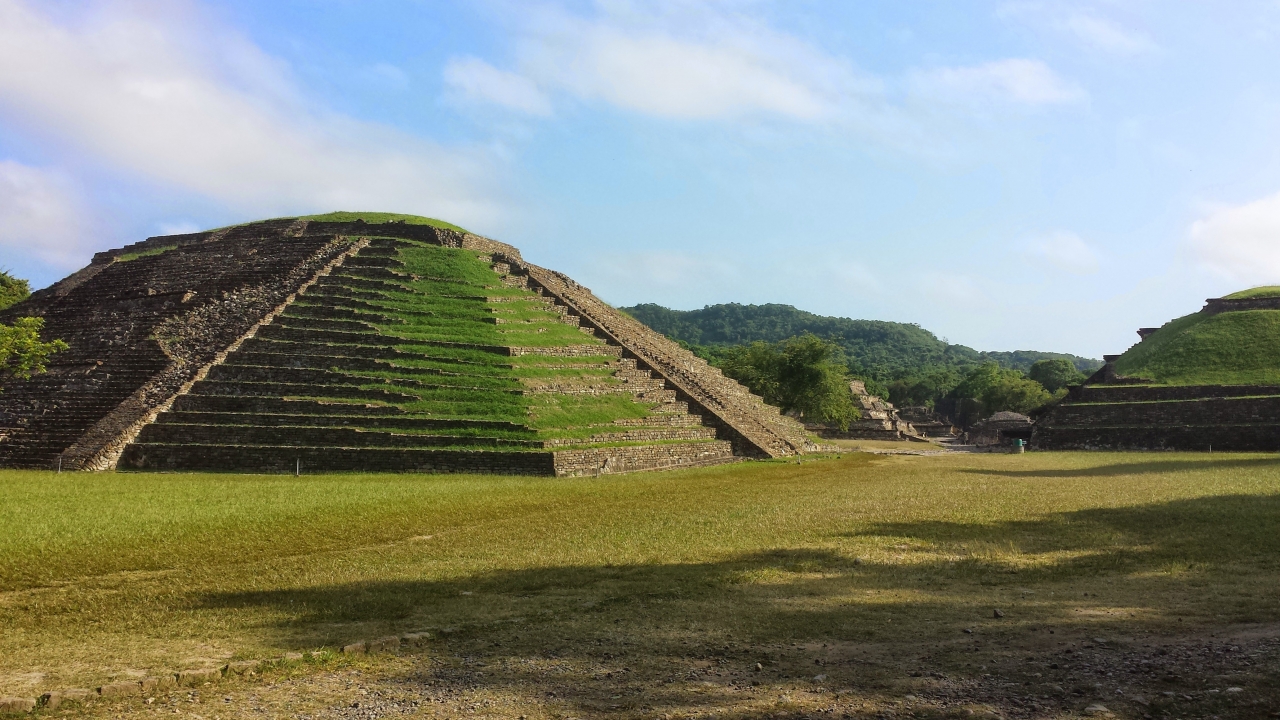
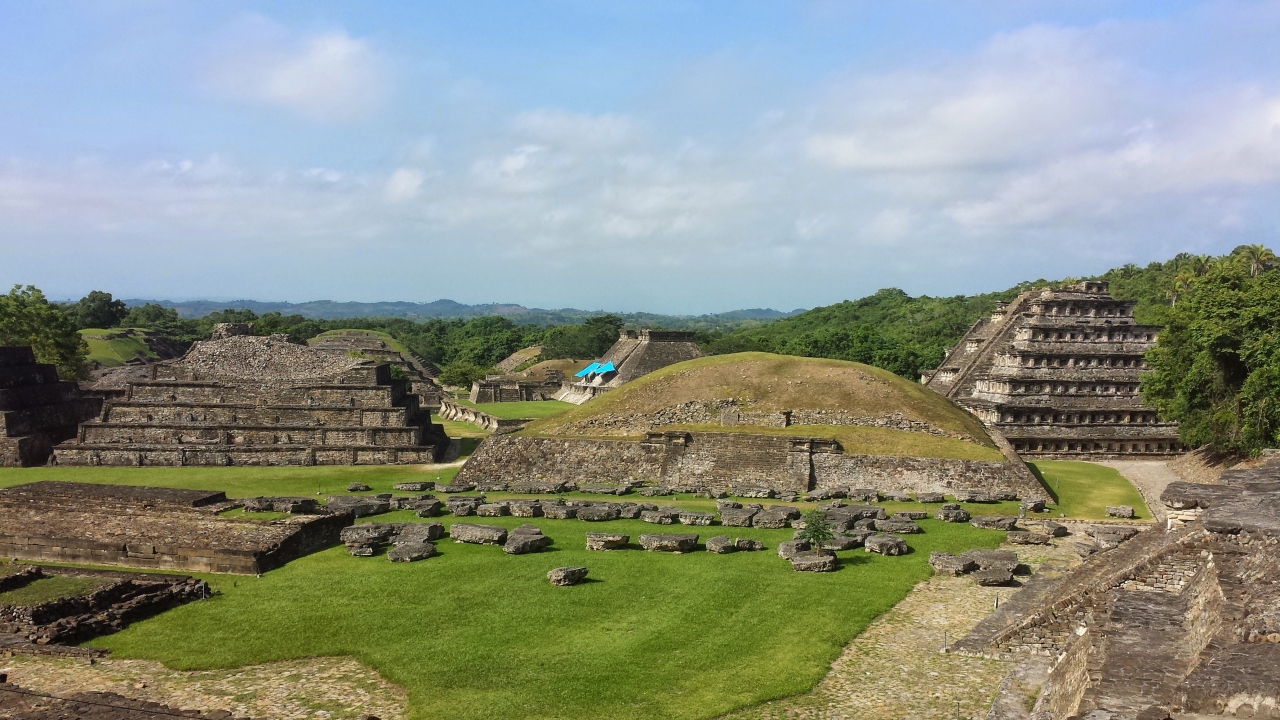
No, that does not mean go dump your trash in the river.
On my way out, I was approached by a worker. He spoke some English and had unusually fair skin for Mexico.
"Is it your bike out front?"
"Yes."
"You speak Spanish? My English is no good."
"A little."
"Could I talk to you later? I saw your bike and I have many questions."
Benjamin is an archaeologist working at the ruins and wants to go on a long-distance bike tour of his own one day, so he wanted to know about my tour and how to go about doing one. I met a few more workers here, anthropologists, one of which was from Alaska. When I made a mistake and said the French word for rain instead of the Spanish one, Benjamin noticed.
"You speak French?"
"Yes, better than Spanish."
"I am from Paris!"
We started trying to talk in French, but speaking in Spanish for a week has made it a habit and pushed out some of my French. There were words I know perfectly well but can only remember in Spanish now. We wound up conversing in all three languages, sometimes in the same sentence, and understood each other perfectly!
By the time I was even thinking of leaving, it was past 11:00 AM. I had a lot of backtracking to do and would essentially be starting the whole day now. Benjamin invited me to stay with him and said he'd have a party at his place in my honor tonight. Oh, what the hell!
I hung around in the office the rest of the afternoon, until Benjamin got off work. He took me back behind the excavated ruins, into the jungle to see the mostly-buried ruins still to be unearthed. At one point, we came upon one that was poking out above the rest. We climbed up.
"Here, this is like capitol. The governor would be here and people would carry columns to this. The governor could stand on top here and see all of Tajin, all from one place. And here, the politicians would meet. The main building was not religious, but political."
There used to be statues on the outside of the building, but they had been removed and put in a museum. The jungle had made a little too much progress for us to see the other ruins, even though we were well above everything. Someday I suppose that building will be fully excavated too, but until then, I got to see the capitol of Tajin, and most people don't.
I then followed Benjamin to his house, buried in the forested mountains nearby. It could be described as a bright blue cinder block, nothing fancy at all, but with personal touches. It's a home.
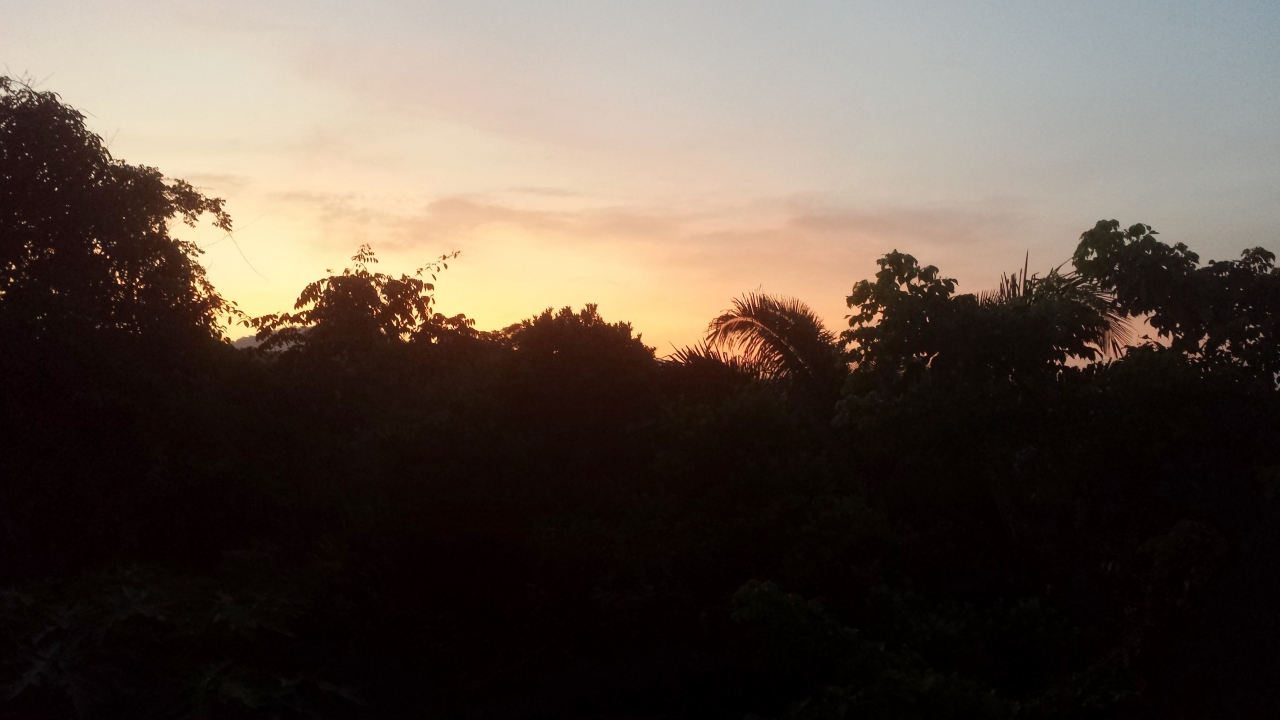
You don't notice how much water a shower or a toilet uses until you have to do it manually with a bucket. I'm going to try to take shorter showers from now on. With the possible exception of energy, water is our most limited resource, and we could all stand to use a little less. And while it wouldn't be pretty, we can live without electricity. We did it for a long time up until a short while ago. Water is another story.
The party didn’t happen, but Benjamin and I had a good time anyhow, sharing a drink or two, eating tacos, talking about places we've been and where we'd like to go. Later his friend Judit came over and we danced cumbia, the local variation on salsa.
"We do not have so much things, but I get to do something interesting, and every night, we can drink, we can play music, dance, have good time. We are free."
Hard to argue with that.
By the end of the night, Benjamin had confirmed that there would really be a party tomorrow night, including a barbecue, with a few of his co-workers that I'd met that day.
"There will be girls!" he added. Salsa dancing with beautiful women was a hard sell. I was already indulging by taking an unplanned day off today. Another?!
It's warm enough at night that sometimes I don't use sheets at all. That night, I woke up to something rather large, maybe the size of a kitchen sponge, climbing onto my foot and running up the length of my bare leg. I spazzed out and shook it off. In the dark, I never saw what it was. Based on its size and impressive speed, I thought a lizard was the only likely candidate. That is, until the next day when I saw a spider the size of my outstretched hand.
I asked someone what kind of spider it was and they described it as "The spider that jumps."
"Is it dangerous? Poison?"
"Oh yes! It can make you dead!"
I might start using sheets again.
In the morning, I'd decided to leave. That is, until Benjamin showed me the washing machine that I could use while he was at work. Barbecue and dancing came close, but a washing machine turned out to be the clincher. Those aren't common in Latin America. I stayed behind at his house to wash everything, then spent the day catching up on my reading, my journal, and my sleep schedule.
An evening of dancing, steak, chorizo tacos, new friends, and a few cervezas. I haven't been able to enjoy myself in such a fashion in a long time. Just what I needed.
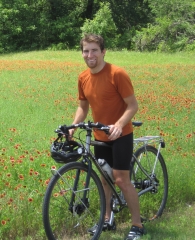


 June
June

